 QBT – Business travel made simple
QBT – Business travel made simple
 QBT – Business travel made simple
QBT – Business travel made simple
 QBT – Business travel made simple
QBT – Business travel made simpleLow-Cost Carriers: Budget carriers characterised by lower fares and fewer frills than those offered by superlative ‘legacy’ carriers.
More often than not, travellers booking with low-cost carriers (LCC) forfeit the standard luxuries they experience with full service airlines. Things like complimentary meals, loyalty programs and the option of tiered seating classes are non-existent.
The amount of business travellers opting for low-cost carriers today can mostly be attributed to the increased pressure to cut corporate travel budgets. However, there are some luxuries that are just non-negotiable.
This leaves us with one question: what's the best option for your corporate travellers?
We've compiled a list of features typical of the respective carrier types to help you identify the right option.
Characteristics of low-cost carriers
Low fares
While you can often achieve similar fares with smart buying and use of inflexible fares from legacy carriers, low-cost carriers are characterised by cheaper prices.
Use-it-or-lose-it rules
These are strictly enforced, especially with the cheapest tickets.
Ancillary fees
Expect to pay for ‘extras’ like luggage, meals, seat selection.
Secondary airports
Don’t be surprised if you have to use secondary airports for some of these services. For example, Scoot doesn’t fly to Brisbane, but uses the Gold Coast instead.
No loyalty program
Your travellers generally won’t earn points for their trips.
No airport lounges
While the airlines don’t have airport lounges, some travellers with memberships to lounges may be able to use those. For example, Qantas Club members can use that lounge if they’re on a Jetstar flight.
Single-class cabins
While the original LCCs had only economy class seating, some airlines in this category now have a few ‘business class’ seats, or charge more for rows with extra leg room, like exit rows.
Online booking
The LCC model is based on direct bookings, but increasingly these carriers are being forced to make their inventory available through the traditional distribution channels.
No corporate deals
Don’t expect to be able to negotiate incentives or discounts on published fares.
Limited interline arrangements
These make low-cost carriers less convenient when doing multi-stop trips on different carriers.
Characteristics of full service carriers
Generally higher fares
Though it’s worth noting that airline economics do mean that even legacy carriers have to offer discounts to keep their planes full.
Special corporate deals
Across the board discounts and route deals are the standard, especially if you can guarantee the airline the lion’s share of your bookings.
More inclusions
Expect the fare of full-service carriers (FSC) to include luggage allowance and inflight meals or snacks.
More extensive routes
These carriers don’t have to chase the most popular leisure destination so there are more options for you.
Airport lounges
Corporate programs often include lounge access which is generally offered with premium fares.
Loyalty programs
Your travellers will earn points for each trip, which is useful to reinforce compliance, but can be a distraction if they’re members of different programs.
Alliances
Most legacy carriers belong to one of the global alliances or have codeshare arrangements with other legacy carriers, ensuring a more seamless experience when travelling internationally.
Multi-class cabins
Travellers will have a choice between economy, premium economy and business class. Some airlines still have first class on certain routes.
So which option is right for you?
Both products have their benefits and pitfalls, and it’s not unusual for corporations to use a mix of the two. Your choice will largely depend on where your organisation sits on the cost vs. traveller experience continuum.
If you’re keen savers and have a tight travel budget, you’ll more than likely opt for LCCs. However, if your company ranks the comfort of staff as more important than cost, you’ll probably opt for legacy carriers.
The decision will also be affected by the routes you use most. If the bulk of your travel is between Sydney and Brisbane, you can probably save a bundle by using LCCs and not upset too many travellers.
But try convincing your sales director to sit in a tiny economy seat on an eight-hour flight to Singapore with no meals, movies or bar service! If you do a lot of travel within the US or Europe, you can also benefit from some excellent LCCs.
Corporate travellers tend to favour legacy carriers which are geared towards corporate deals and three-way relationships with travel management companies (TMCs). In fact, if you have enough volume and good compliance, it generally makes sense to use full service airlines which offer much more – often for not much more money.
If you’re still not sure what mix of LCCs and legacy carriers would work best for your organisation, contact us and one of our friendly team will be happy to discuss this with you.

 Contact us
Contact usNeed help immediately? Our support specialists are standing by to answer your questions in real time